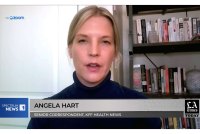Listen to ‘Tradeoffs’: How the Loss of a Rural Hospital Compounds the Collapse of Care
Six years ago, the hospital in Fort Scott, Kansas, shuttered, leaving residents in the small community without a cornerstone health care institution. In the years since, despite new programs meant to save small hospitals, dozens of other communities have watched theirs close.
What the Health? From KFF Health News: New Year, Same Abortion Debate
Some Supreme Court justices were wrong if they assumed overturning “Roe v. Wade” would settle the abortion issue before the high court. At least two cases are awaiting consideration, and more are in the legal pipeline. Meanwhile, Congress once again has only days until the next temporary spending bill runs out, with no budget deal in sight. Lauren Weber of The Washington Post, Shefali Luthra of The 19th, and Victoria Knight of Axios join KFF Health News chief Washington correspondent Julie Rovner to discuss these issues and more. Also this week, Rovner interviews Sandro Galea, dean of the Boston University School of Public Health, about how public health can regain public trust.
Listen to the Latest ‘KFF Health News Minute’
“Health Minute” brings original health care and health policy reporting from the KFF Health News newsroom to the airwaves each week.
In Year 6, KFF Health News-NPR’s ‘Bill of the Month’ Helps Patients in a Changing System
In the sixth year of the KFF Health News-NPR “Bill of the Month” series, patients shared more than 750 tales of medical billing problems, and reporters analyzed more than $730,000 in charges — including more than $215,000 owed by 12 patients and their families.
What the Health? From KFF Health News: 2023 Is a Wrap
2023 was another busy year in health care. As the covid-19 pandemic waned, policymakers looked anew at long-standing obstacles to obtaining and paying for care in the nation’s health care system. Meanwhile, abortion has continued to be an issue in much of the nation, as states respond to the Supreme Court’s 2022 decision overturning the constitutional right to the procedure. This week, Rachel Cohrs of Stat, Sandhya Raman of CQ Roll Call, and Joanne Kenen of Johns Hopkins University and Politico Magazine join KFF Health News chief Washington correspondent Julie Rovner to discuss these issues and wrap up the year in health. Also this week, Rovner interviews KFF Health News’ Jordan Rau about his joint KFF Health News-New York Times series “Dying Broke.”
What the Health? From KFF Health News: Abortion and SCOTUS, Together Again
The Supreme Court agreed this week to hear its first major case on abortion since overturning Roe v. Wade — one that could restrict the availability of the abortion pill mifepristone, even in states where abortion remains legal. Meanwhile, on Capitol Hill, lawmakers in the House and Senate finally moved to renew health programs that expired in October — but it’s likely too late to finish the job in 2023. Alice Miranda Ollstein of Politico, Riley Griffin of Bloomberg News, and Lauren Weber of The Washington Post join KFF Health News chief Washington correspondent Julie Rovner to discuss these issues and more. Also this week, Rovner interviews Jen Golbeck, a University of Maryland professor and social media superstar, about her new book, “The Purest Bond,” which lays out the science of the human-canine relationship.
Journalists Delve Into Gun Violence, Medicaid’s ‘Unwinding,’ Opioid Lawsuits, and More
KFF Health News and California Healthline staffers made the rounds on national and local media this week to discuss their stories. Here’s a collection of their appearances.
What the Health? From KFF Health News: Democrats See Opportunity in GOP Threats to Repeal Health Law
Sensing that Republicans are walking into a political minefield by threatening once again to repeal the Affordable Care Act, the Biden administration is looking to capitalize by rolling out a series of initiatives aimed at high drug prices and other consequences of “corporate greed in health care.” Meanwhile, the Supreme Court hears a case that could determine when and how much victims of the opioid crisis can collect from Purdue Pharma, the drug company that lied about how addictive its drug, OxyContin, really was. Alice Miranda Ollstein of Politico, Anna Edney of Bloomberg News, and Rachana Pradhan of KFF Health News join KFF Health News chief Washington correspondent Julie Rovner to discuss these issues and more. Also this week, Rovner interviews Dan Weissmann of KFF Health News’ sister podcast, “An Arm and a Leg,” about his investigation into hospitals suing their patients over unpaid bills.
Readers Slam Hospital Monopolies and Blame the Feds for Understaffed Nursing Homes
KFF Health News gives readers a chance to comment on a recent batch of stories.
What the Health? From KFF Health News: Trump Puts Obamacare Repeal Back on Agenda
Although Republicans have never united behind a replacement for the Affordable Care Act, 2024 GOP presidential front-runner Donald Trump said this week he wants to put the issue back on the national agenda. That delights Democrats, who have won at least two elections partly by defending the now-popular health law. Meanwhile, the Texas Supreme Court takes up a case brought by women who say their pregnancy complications further endangered their health due to the vagueness of Texas’ near-total ban on abortions. Joanne Kenen of Johns Hopkins University and Politico Magazine, Sarah Karlin-Smith of the Pink Sheet, and Victoria Knight of Axios News join KFF Health News chief Washington correspondent Julie Rovner to discuss these issues and more. Also this week, Rovner interviews KFF Health News’ Rachana Pradhan, who reported and wrote the latest “Bill of the Month” feature.
KFF Health News editor-at-large for public health Céline Gounder discusses how families of transgender youth are uprooting their lives due to anti-trans policies and their ripple effects.
Journalists Delve Into Open Enrollment, School Nurse Shortages, and More
KFF Health News and California Healthline staff made the rounds on national and local media this week to discuss their stories. Here’s a collection of their appearances.
What the Health? From KFF Health News: Congress Kicks the (Budget) Can Down the Road. Again.
Congress narrowly avoided a federal government shutdown for the second time in six weeks, as Democrats came to the rescue of divided House Republicans over annual spending bills that were supposed to be finished by Oct. 1. But the brinksmanship is likely to repeat itself early in 2024, when the next temporary spending patches expire. Meanwhile, a pair of investigations unveiled this week demonstrate how difficult it still is for seniors to get needed long-term and rehabilitation care. Alice Miranda Ollstein of Politico, Rachel Cohrs of Stat, and Joanne Kenen of Johns Hopkins University and Politico Magazine join KFF Health News’ Julie Rovner to discuss these issues and more.
What the Health? From KFF Health News: A Very Good Night for Abortion Rights Backers
Abortion rights backers won major victories in at least five states in the 2023 off-year elections Nov. 7, proving the staying power of abortion as a political issue in the wake of the Supreme Court’s 2022 decision overturning Roe v. Wade. Meanwhile, the National Institutes of Health finally has a new director, after Democrats temporarily blocked President Joe Biden’s nominee over a mostly unrelated fight about prescription drug prices. Alice Miranda Ollstein of Politico, Tami Luhby of CNN, and Sandhya Raman of CQ Roll Call join KFF Health News’ Julie Rovner to discuss these issues and more. Also this week, Rovner interviews KFF Health News’ Julie Appleby, who reported and wrote the latest “Bill of the Month” feature.
Epidemic: The Scars of Smallpox
The series finale of “Epidemic: Eradicating Smallpox” is a visit to the home of Rahima Banu, the last person with a documented case of naturally occurring variola major smallpox. When the virus was declared eradicated, she became a symbol of one of the greatest victories in global public health. What happened to Rahima Banu afterward?
What the Health? From KFF Health News: For ACA Plans, It’s Time to Shop Around
It’s Obamacare open enrollment season, which means that, for people who rely on these plans for coverage, it’s time to shop around. With enhanced premium subsidies and cost-sharing assistance, consumers may find savings by switching plans. It is especially important for people who lost their coverage because of the Medicaid unwinding to investigate their options. Many qualify for assistance. Meanwhile, the countdown to Election Day is on, and Ohio’s State Issue 1 is grabbing headlines. The closely watched ballot initiative has become a testing ground for abortion-related messaging, which has been rife with misinformation. This week’s panelists are Mary Agnes Carey of KFF Health News, Jessie Hellmann of CQ Roll Call, Joanne Kenen of the Johns Hopkins Bloomberg School of Public Health and Politico, and Rachana Pradhan of KFF Health News.
Medical Debt and Nurse Shortages Haunt Winning Halloween Haikus
Entries for our fifth annual Halloween haiku contest left us terrified. Based on a review by our panel of judges, here’s the winner and runners-up — plus the original artwork they inspired.
Watch: California and Feds Invest in Health Care for Homeless People
KFF Health News senior correspondent Angela Hart discusses big developments in street medicine, both statewide and nationally.
What the Health? From KFF Health News: The New Speaker’s (Limited) Record on Health
The House finally has a new speaker: Mike Johnson (R-La). He’s a relative newcomer who’s been a lower-level member of the House GOP leadership. And while he’s an outspoken opponent of abortion and same-sex marriage, his record on other health issues is scant. Meanwhile, the National Institutes of Health appears on track to be getting a new director, and Georgia’s Medicaid work requirement experiment is off to a very slow start. Alice Miranda Ollstein of Politico and Rachel Cohrs of Stat join KFF Health News’ Julie Rovner to discuss these issues and more. Also this week, Rovner interviews Michael Cannon, director of health policy studies at the Cato Institute, a libertarian think tank.
Epidemic: What Good Is a Vaccine When There Is No Rice?
What good is a vaccine when there is no rice? Episode 7 of “Eradicating Smallpox” explores the barriers public health workers face in communities where people’s basic needs aren’t being met.
















